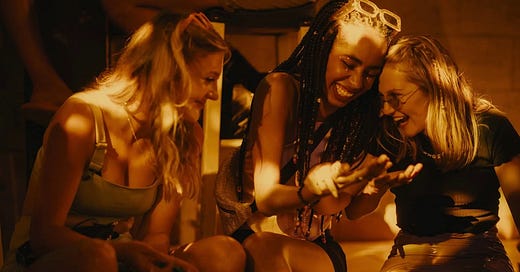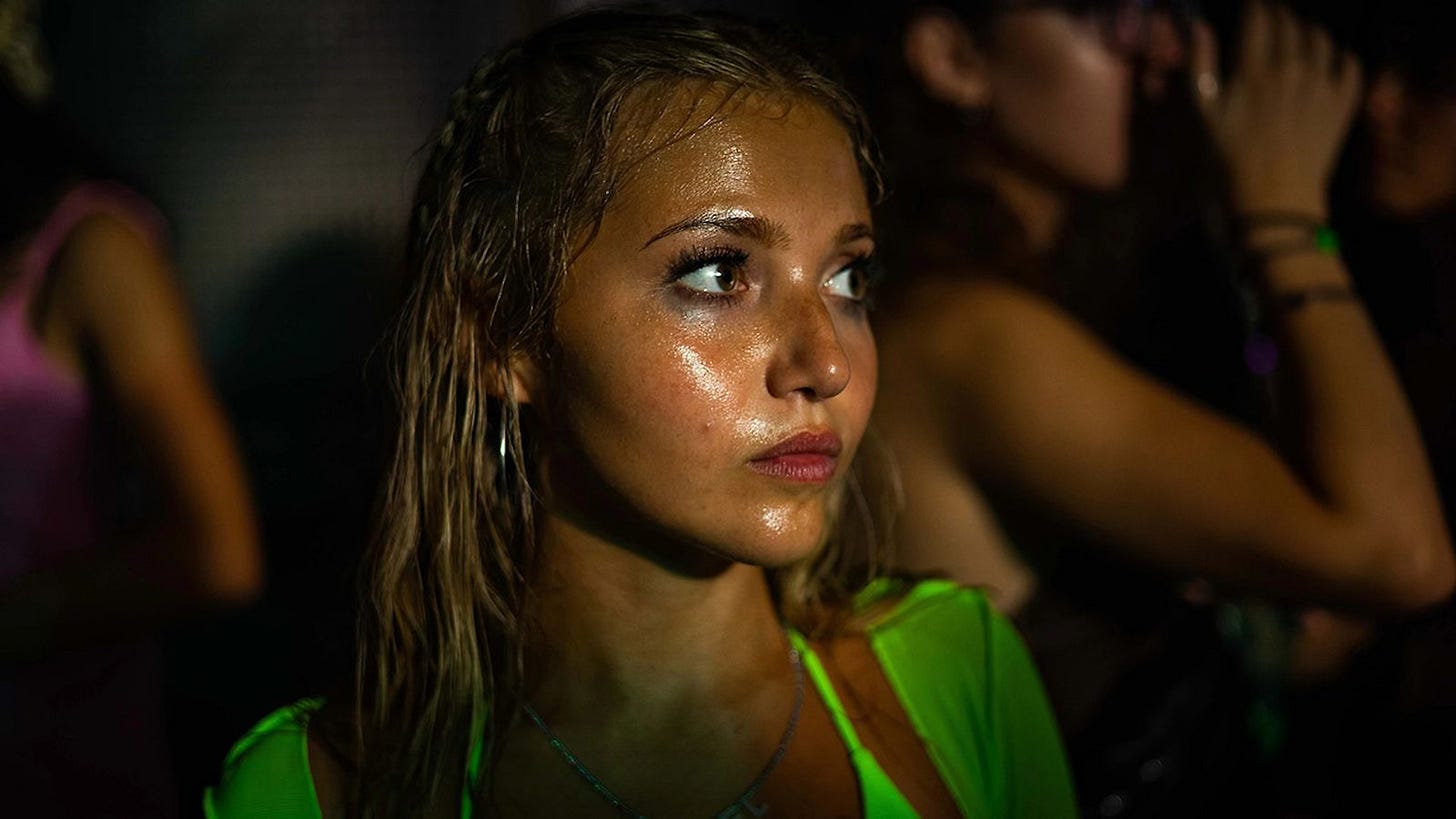How to Have Sex (2023) is written, directed and produced by women. It’s a film about sexual assault but also about Tara and most, if not all of us, women who have been her. We’ve all had a friend like Skye, been surrounded by toxic jealousy and insecurity, felt isolated, and misplaced within a friend group. Whether sexual or otherwise, many of have done things we didn’t necessarily want or felt like doing.
The director and writer, Molly Manning Walker, isn’t looking to reinvent the conversation about assault with this movie—only to reinforce it. Yes, the title is provocative, but this is purposely done in order to provoke the complex conversations about consent, alcohol, the male gaze, and the film’s narrative. It’s a wild ride of highs and lows, techno beats, and strobe lights. We are with there, in Greece, onlooker to sex and drinks. We are Tara, in many scenes and many ways. There is almost a discomfort to watching it all play out, especially if you’ve experienced something similar first-hand.
The Female Gaze versus the Male Gaze
It’s important to understand what we’re talking about when we reference the ‘male gaze’ which has dominated the film industry for decades. It’s a feminist theory that frames women as passive objects of male desire, our bodies often fragmented and stylized to satisfy an imagined male viewer. We aren’t meant to be understood as humans with our own desires and complexity. More often than not, we are simply reduced to our looks and what we can be objectified for.
The female gaze flips this lens and centers women’s inner lives and perceptions. How to Have Sex is raw and real because of this. The focus on what Tara looks like or how her presence impacts others is there, but that’s because it’s a universally female experience. The narrative of how she experiences her world is there, and it is valued. We are encouraged to feel with her, not to sit back and watch her. Her moments of discomfort and confusion, joy and insecurity—they’re unfiltered. We’re not watching this movie so that we can judge her actions or regard her as a victim, but rather realize the complexity of teenage girlhood, female friendships, sexuality and sexual assault, and consent.
I think that what this film does through its cinematic make-up and narrative is make us intentionally uncomfortable so that we don’t dare to look away. In its most triggering scene, I was there. I was Tara, and Tara was me. There is a realness to it, and I, as the viewer, am faced with the reality that this happens. We are young, but we are women. We are strong, but we can also be vulnerable.
Something How to Have Sex does is not treat us as a voyeur. It is what so many Hollywood and mainstream, male-directed movies do. These make us women feel uncomfortable, too, but for wholly different reasons.
With Walker’s direction, we’re not meant to analyze Tara or Skye or Em. They’re just girls, living their lives. We are asked to participate in this reality of being young and female. There’s many close-up shots of Tara in the clubs that draaaaaaag, and they’re awkward. But you don’t get to just look away as you please. The soundscape and visuals are immersive, almost hypnotic, and you physically cannot not be in the moment as though you yourself were 16, drunk and dancing to bad disco music on a weekend-getaway with your best friends in Greece.
By channeling the female gaze, we are faced with the world that we, as women, live in: full of hidden tensions, complexities, and contradictions that male-centric perspectives fail to acknowledge or misinterpret. By situating us within Tara’s mind and heart, Walker reveals the subtle power dynamics and societal pressures that shape women’s choices. The female gaze is more than just ‘feminist theory’—it’s a space to reflect that asks people to reconsider whose stories we are used to seeing and whose perspectives are ignored. Films like How to Have Sex are about more than just creating a female-centered narrative.
As a young woman living in a (wo)man’s world that means I have to navigate spaces where my personhood is not valued, my choices are (increasingly) limited, and my opinions and experiences are often ignored. It’s films like these that give me hope because it’s not just a film. It’s a statement about who gets to tell the story and, ultimately, who gets to be seen.
Check out a great Letterboxd article and interview with the director and writer here.
To end this little foray into film and feminist theory on a lighter note, I’m grateful to you for dedicating a bit of your time to read this. Let me know your thoughts and definitely give the movie a watch if you haven’t yet. I’d also be super thankful if you shared this post as well as my Substack, it’s always free to subscribe <3







The way you write about this film makes me want to see it. Maybe seeing it would change my view of the world, change my life for the better.